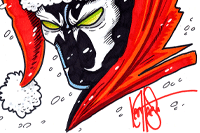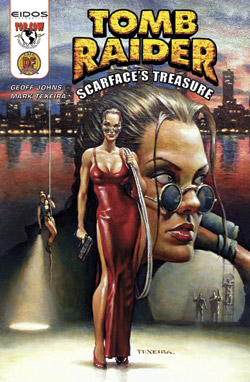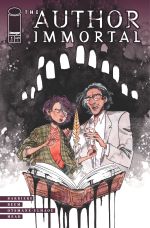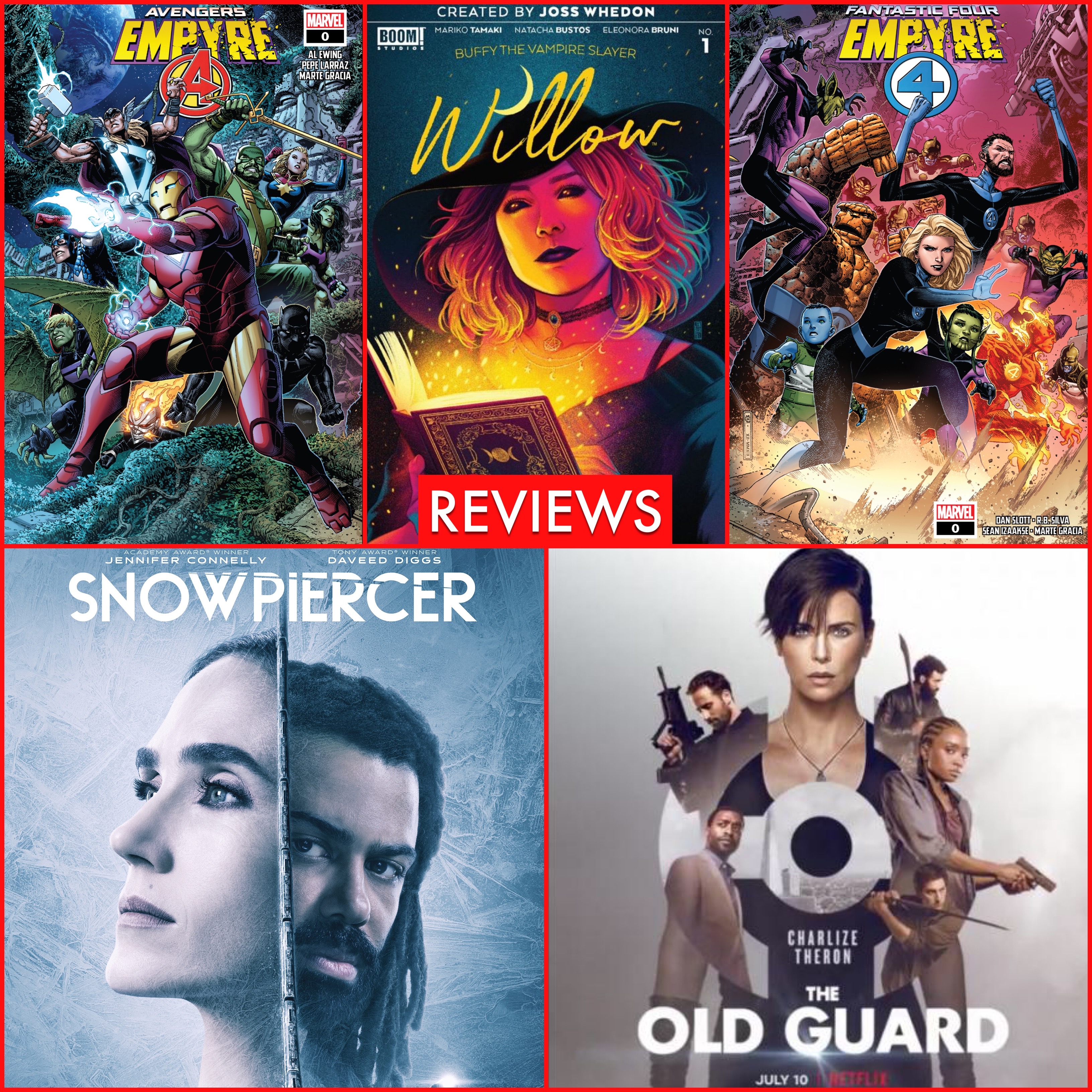|
 |
WAITING
FOR TOMMY: GEOFF JOHNS
By
Richard Johnston
RICHARD:
Modern Westerns - well, there's Once Upon A Time In Mexico.
Gangster? Sopranos or Snatch.... none of these are traditional
films of their genre, they're more aware of what's been. Hell
the closest I've seen to a traditional Western of late was
Firefly, and they had to put that in space and make it post-Buffy
ironic. Clint Eastwood had to go into space as well... even
Unforgiven was a work of deconstruction. Basically I'm wondering
if anything can be true to its original genre anymore after
it's been commented on by an example of its own genre? Just
as it's now harder to make a traditional slasher/horror movie
without having to deal with what Scream brought to the genre.
How has the existence of, say, Watchmen, The Authority, Ultimate
Spider-Man or, say, recent Daredevil affected how you tell
a "traditional" superhero story? And how does that tie in
with your current Flash arc?
GEOFF:
A fantastic question, Rich. Any genre constantly evolves,
and parody or being self-aware, eventually will spring forth
during this evolution but that's only part of the evolution.
Let's look at Gangster films. They didn't start with Godfather.
They were there almost from the very beginning of American
Film. Movies like The Public Enemy, Quick Millions, The Roaring
Twenties all hit in the 1930's. And then as concerns changed
in the 40's, gangster films reflected those changes, even
more so in the 50's when news about organized crime came to
the forefront with the help of television. With the war over,
crime at home was more of a concern. Look at the typical cliche
film -- Hoodlum Empire, which could've told anyone that as
of 1952 the Gangster genre was dead. But then you have On
the Waterfront and Some Like It Hot, which I bet for the majority
of comic readers out there are the only Gangster films they've
seen out of the ones listed above. Someone out there always
knew how to twist the convention, the characters, the perspective.
Bonnie and Clyde woke the genre up again in the 60's, Godfather
in the 70's. The genre has looked at itself, parodied itself,
found the cliches -- Once Upon a Time in America is exactly
what that film does. But still the genre survives. As you
said, Sopranos and Snatch are there, as well as Get Shorty,
Casino, Pulp Fiction, Grosse Pointe Blank, Donnie Brasco,
LA Confidential, Fargo, Out of Sight. And you can bet, that
heist and gangster and organized crime as a subject and genre
will continue to evolve. And someone out there will think
gangster films didn't exist until Sopranos.
As far
as tradition -- having a gangster hold a gun and put a hit
on somebody can be equated to having a super-hero wear a cape
and save someone's life. It's a staple of the genre, and it'll
be twisted and turned around, but it's not going to go away.
Take another
example of a sub-genre -- "buddy films" -- in the last few
decades, since I have direct experience with this. When Donner
directed Lethal Weapon and it became a success, along with
a few other classics like 48 Hours, buddy films were "hot."
Eventually leading to things like Loaded Weapon where it's
all about parody. Even Lethal Weapon 4, which obviously is
not the strongest of the four films, begins to parody itself.
But as the audience changes and the people involved in production
change, it starts circling back again, looked at with a different
perspective. With movies like Bad Boys or even, a combination
of Western and buddy film, Shanghai Noon, the genre gets dusted
off and a project works, which in turn gets more audiences
to want to see something like that and more studios saying,
"Let's make that film."
You can
also see this cycle in slasher/horror films. They were "dead"
until Scream came out and addressed everything we all knew
about slasher/horror films. Later films like Sixth Sense,
Blair Witch, and the Ring again redefine the modern horror
genre, or at the very least, give it a new lease on life.
And the remaking of the Texas Chainsaw Massacre comes out
and it is the #1 movie. This, I'm sure, will result in more
slasher films getting the green light. New Line and Dimension
built most of what they are on horror films.
What's
this all have to do with super-hero comics and tradition to
me?
Watchmen
(hell, Alan Moore himself) and those very few other monumental
projects that have hit comic books made not only the audience,
but the creators, take another look at the genre. And that's
a good thing. Books you mention like Ultimate Spider-Man,
Authority, Wildcats, 100 Bullets, Daredevil, are all fantastic.
But calling myself a traditional writer, maybe I see that
as meaning something different than you do. Writing super-heroes,
dealing with super-villains and costumes and powers and subplots,
is to me, traditional. Growing up reading Mark Waid's THE
FLASH, Peter David's THE INCREDIBLE HULK, John Ostrander's
SUICIDE SQUAD and Grant Morrison's ANIMAL MAN influenced me.
On some level, they're all traditional in a sense, but they
skew it. They look at it from a different angle. I try to
do that with the work I do. But at the same time, this is
a comic book. It's not a movie or a television show, it's
a comic. So let's wear costumes, let's use villains and the
history of the universe. That's just my personal preference
of working on super-hero books. That's what I like to do.
Others disagree and that's fine. That's why diversity among
comics is so great. Also, I would rather write a monthly book
than a mini-series for these reasons. I like the monthly format.
I think
the biggest challenge with super-hero books today, that creators
may have not had twenty years ago, was that the audience is
staying with comics. They've read hundreds and hundreds of
super-hero books. They've seen Batman kick Joker's ass seventy
times and Spider-Man almost kill Green Goblin fifty times.
How do you make that interesting for both the new and older
reader? Capturing both audiences is the trick. Ultimate Spider-Man
has done it, deservedly so. That's the main objective of Teen
Titans, JSA, The Flash, etc. To be accessible, but at the
same time show them something new about the characters or
concepts. It's really a juggling act, but it's vital if we
want to keep the audience and have it grow. It's also vital
to have new concepts like Runaways and Arrowsmith - two of
the best books out there -- and imprints like Vertigo, but
you can't ignore the fact that the DC and Marvel characters
are well-known. For many they were a doorway into other books
like Vertigo, Wildstorm, etc. and that's great. Let's keep
using them as that.
In the
end, I don't care how people get into comics or what they
read, as long as they are there. I fill a certain niche that
I enjoy right now so that's what I'm doing.
And with
the Flash, I don't want to get into it too much, because the
arc will itself, but for me, the Flash has always been THE
super-hero book. From the introduction to DC's Silver Age
to Mark Waid bringing fun back to super-heroes after years
of "realism" to Grant doing his run on the Flash during his
rebirth of JLA to Scott and I saying, "Hey, it's okay to have
a Rogues Gallery!" -- the Flash has always grabbed hold of
what super-heroes are. Ignition plays with the trends of today,
and celebrates the super-heroics of yesterday and tomorrow.
Pages:
1 | 2
| 3 | 4
| 5 | 6
| 7 Continued
Here... |
 |







